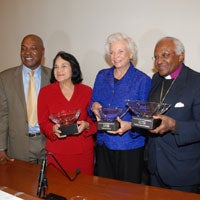In a two-day conference sponsored by Harvard Law School’s Charles Hamilton Houston Institute for Race and Justice—titled “Charting New Pathways to Participation and Membership”—attendees from the worlds of law, labor, government, academia talked about the obstacles to justice faced by many groups and how those impediments might be overcome.
The highlight of the conference was a Saturday panel that brought together three of five recipients of the Charles Hamilton Houston Justice Award that were bestowed that day—retired U.S. Supreme Court Justice Sandra Day O’Connor, Archbishop Desmond Tutu of the Anglican Church of Cape Town, South Africa; and Dolores Huerta, co-founder of the United Farm Workers of America—to discuss “The Path to Inclusive Civic Participation.” (The other recipients—Pius Langa, chief justice of the Constitutional Court of South Africa, and John Hope Franklin, a Duke University history professor, were unable to attend.)
O’Connor, renowned for writing the 5-4 majority opinion in Grutter v. Bollinger, a ruling that shot down a challenge to the University of Michigan Law School’s use of affirmative action, described her own career path to exemplify changes that have occurred for women lawyers. Following graduation near the top of her class at Stanford Law School in 1952, O’Connor said, “I not only did not have an offer from a law firm; I could not get an interview.”
“But we’ve had a revolution in this country,” said O’Connor, who became the first woman to be named to the nation’s top court by President Reagan in 1981. “Today, women law graduates don’t have any trouble at all in getting an interview and getting a job. And it’s been a joy to see the change.”
Archbishop Tutu spoke of apartheid’s end in his country as an example of what can result when broad public pressure is brought to bear upon an oppressive governmental system.
“We were able to do it because we had so many people in the world who supported us” through disinvestment campaigns and other actions. “I speak on behalf of millions and millions of my compatriots when I say thank you for helping us become free.”
He said South Africa still has many problems, including poverty, but the nation is much better off. Part of that improvement, he said, is the end of South Africa’s racially divisive Immorality Act, which prohibited all sexual relations between whites and non-whites.
“Today you see mixed couples walking around hand in hand—no, no; sometimes they’re in such a clinch that you couldn’t put a razor between them—and as far as I can tell, the sky is still firmly in place.”
Tutu also expressed his gratitude for the role students played in ending apartheid. “I know that I speak on the behalf of millions and millions of my compatriots when I say: thank you for having helped us to become free,” Tutu said. “Students were in the forefront, the vanguard of the movement for divestment. And so we knew that the world was with us.”
Huerta who co-founded the United Farm Workers of American with Cesar Chavez in 1962, said that the ultimate success of that organization relied on alliances with religious and labor organizations as well as political support. But initially, she said, “the main thing we did with the farm workers was convince them that they had power. They would say, ‘What power do we have?’ We said, ‘The power is in your person. You need to understand that nothing is going to change unless you take responsibility to change it and to work together.’”
In another panel discussion, five participants shared real-life examples of coalition-building to bridge divisions in communities and workplaces. They included mayors Scott Lang of New Bedford, Mass. and John DeStefano of New Haven, Conn., who spoke of their communities’ unified responses to federal crackdowns on illegal immigrants; carpenter Gregory Hall of San Francisco, lead plaintiff in a lawsuit alleging that an employer pitted African-American workers against Latinos in order to drive down wages; and Rinku Sen, author of two books dealing with community organizing and immigration policies.
